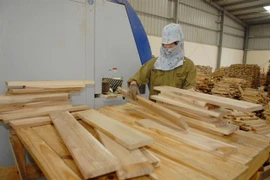HCMCity (VNA) – Vietnam’s plywood exports, despite good growth amid theCOVID-19 pandemic, are facing allegations of dumping and evading trade remediesin two largest markets namely the Republic of Korea (RoK) and the US.
Accordingto the Vietnam Timber and Forest Product Association (VIFORES), plywood exportswere worth 800 million USD last year, accounting for 7 percent of the country’stotal wood and wooden products export value, it said.
The US is the world's largest plywood importer. In 2019 it imported 4.67million cubic metres for 2.72 billion USD.
Its imports from Vietnam were worth 309 million USD, while the RoK’s were worth226 million USD.
VIFORESChairman Do Xuan Lap said plywood is used in making various interior furnitureproducts, and the global market has seen substantial growth in recent years,creating conditions for Vietnam to boost exports.
However, the rapid growth in the country’s exports has brought trade defencerisks in its two largest markets.
In addition, according to delegates at a recent conference titled TradePromotion for Vietnam’s Plywood and Medium Density Fibreboard: challenges andopportunities in the context of COVID held in HCM City, an increase inChinese investment in the sector has caused Vietnam’s plywood exports to faceanti-dumping duties and anti-circumvention in many countries.
TheUS Department of Commerce had said on June 9 it would examine whether hardwoodplywood products completed in Vietnam using Chinese components arecircumventing US duties on imports from China, a move that could see similarduties on Vietnamese imports.
The RoK’s Ministry of Trade, Industry and Energy in April made a preliminarydecision to place anti-dumping duties on plywood products from Vietnam, andrequested the Ministry of Economy and Finance to impose anti-dumping duties of9.18 percent to 10.65 percent on plywood imported from the Southeast Asiannation.
Ngo Sy Hoai, VIFORES Vice Chairman and General Secretary, said “The threat ofanti-dumping lawsuits on plywood products from Vietnam is increasing,especially in the context of its timber industry’s increasing integration intothe world market.”
The US-China trade war has left many manufacturing companies in Vietnam facingtax evasion investigations.
“If we fail to prove the origin of plywood exported to the US, Vietnameseplywood may be slapped with anti-circumvention duties equivalent to the taximposed by the US on plywood exported from China of more than 200 percent."
This will entail a similar risk for products made from plywood such as kitchencabinets, he said.
Trinh Xuan Duong, Chairman of the Vietnam Plywood Association, said in thecurrent context businesses need to join hands through associations and theMinistry of Industry and Trade’s Trade Remedies Authority of Vietnam to opposedecisions to initiate investigations by the US and the RoK and preparesufficient information and data to respond to the investigations.
Le Xuan Quan, Chairman of Nano Architecture and Furniture JS Company, saidlocal wood industry business groups should review their members’ exportactivities to detect any abnormal relationships between their productioncapacity and export volumes.
If they find any violations related to fraudulent origins, they must widelypublicise the case, and authorities need to throw the book at the offenders, hesaid.
Associations called on their members not to pursue short-term benefits by cooperatingwith Chinese firms and declare fake origins so that they do not affect theentire industry.
The conference was jointly organised by VIFORES, the USAID and the TradeRemedies Authority of Vietnam./.




























